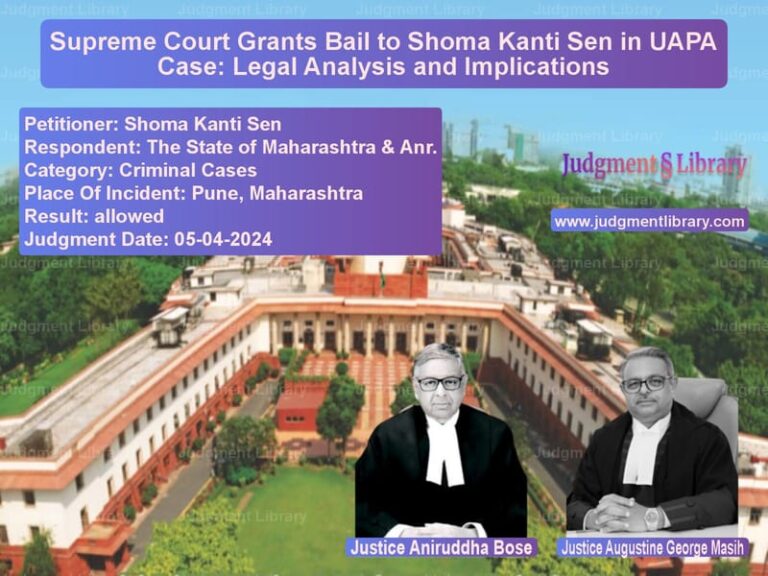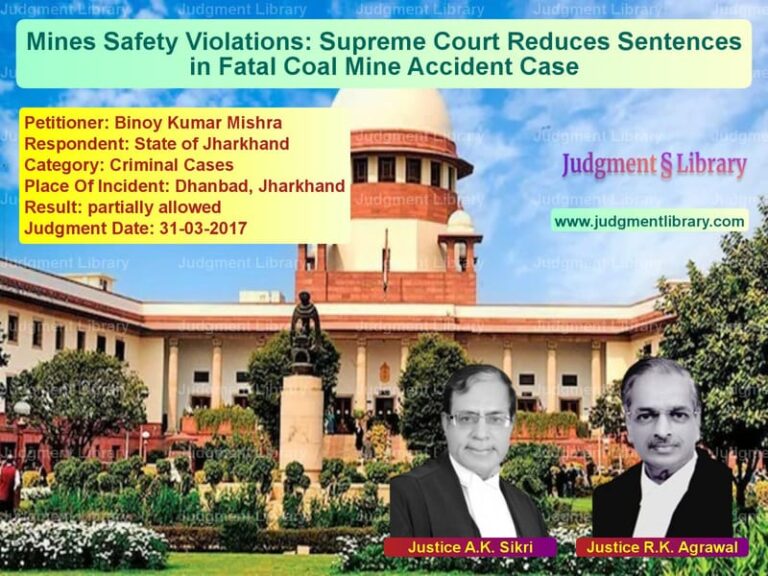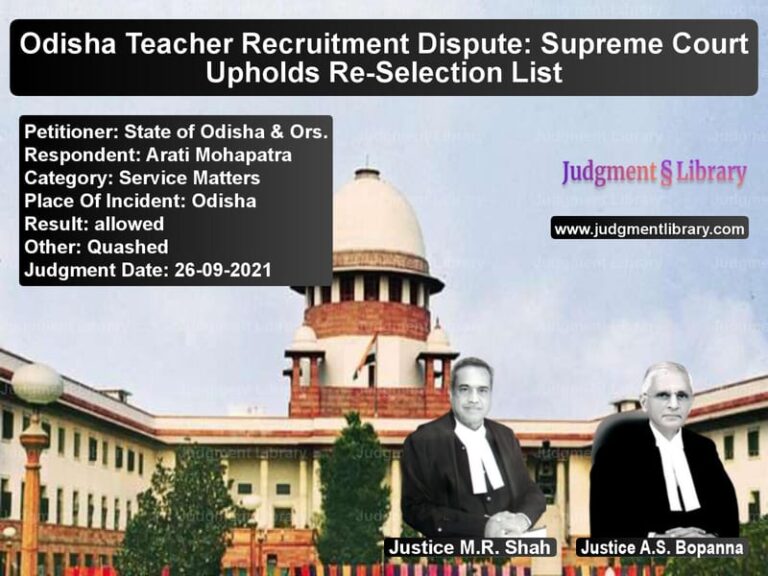Maharashtra Housing Dispute: Supreme Court’s Key Ruling on Unauthorized Construction
The case of Sau Rajani vs. Sau Smita & Anr. revolved around a dispute concerning unauthorized construction in a residential housing complex in Amravati, Maharashtra. The key legal question before the Supreme Court was whether the suit challenging the construction was barred under Sections 71 and 177 of the Maharashtra Housing and Area Development Act, 1976 (MHADA Act). The judgment highlights the balance between statutory housing regulations and individual property rights, reaffirming that civil courts can intervene in cases affecting individual rights.
Background of the Case
The dispute began when the appellant, Sau Rajani, filed a civil suit against her neighbor, Sau Smita, alleging that she had made illegal and unauthorized constructions that affected her property rights. The contested construction was allegedly made on an open vacant site next to the appellant’s home, and it resulted in loss of privacy, obstruction of light and air, and interference with essential utilities like water supply.
The appellant had initially approached the authorities, including the Amravati Housing and Area Development Board, seeking the removal of the unauthorized construction, but no action was taken. As a result, she approached the civil court, seeking an injunction and removal of the illegal structure.
Arguments Presented
Petitioner’s Arguments
- The appellant argued that the unauthorized construction encroached on common spaces and affected her easement rights, including access to light, air, and privacy.
- She contended that the respondent had removed a water pipeline, disrupting her water supply, and locked a service line necessary for septic tank cleaning.
- She asserted that despite repeated complaints, the authorities failed to act, leaving her no option but to seek legal remedy in the civil court.
- She claimed that the provisions of the MHADA Act barring civil suits did not apply to her case since she was not challenging eviction but was seeking protection of her legal rights.
Respondents’ Arguments
- The first respondent, Sau Smita, contended that the civil court had no jurisdiction over the case, as Sections 71 and 177 of the MHADA Act barred such suits.
- The respondents argued that the Competent Authority under the MHADA Act had exclusive jurisdiction to decide disputes related to unauthorized constructions.
- They maintained that since eviction and demolition of illegal construction fell within the powers of the Housing Board, the civil court’s interference was unwarranted.
Lower Court Decisions
Trial Court Decision
The Civil Judge (Junior Division), Amravati ruled in favor of the appellant, holding that:
- The respondent had indeed made unauthorized constructions.
- The construction interfered with the appellant’s rights, including access to light, air, and water.
- The suit was maintainable as it involved individual rights rather than general housing regulations.
The trial court decreed the suit, ordering the removal of the illegal construction and restoration of the water supply.
First Appellate Court Decision
The respondent appealed the trial court’s decision in the District Court, which upheld the trial court’s ruling. The appellate court reaffirmed that the suit was not barred by the MHADA Act, as it primarily concerned the infringement of personal property rights rather than housing policy enforcement.
High Court Reversal
Upon further appeal, the Single Judge of the Bombay High Court reversed the lower court decisions, ruling that the suit was barred by Sections 71 and 177 of the MHADA Act. The High Court held that since the MHADA Act provides a mechanism for handling unauthorized construction disputes through the Competent Authority, the civil court lacked jurisdiction.
Supreme Court’s Observations
The Supreme Court, comprising Justice Dr. Dhananjaya Y. Chandrachud and Justice A. S. Bopanna, overturned the High Court’s ruling and restored the decisions of the trial and appellate courts.
The Supreme Court held:
“A suit of this nature will be maintainable before the civil court and would not be barred by Section 71 or Section 177 of the Act.”
It noted that the appellant was not seeking eviction of the respondent but was challenging a personal injury to her rights caused by unauthorized construction. The court ruled that the bar under the MHADA Act applies only to disputes related to eviction and official housing regulations, not private property rights.
Key Findings
- The appellant’s claim concerned individual property rights rather than general housing regulation enforcement.
- The civil court had jurisdiction since the claim did not fall under the eviction provisions of the MHADA Act.
- The High Court erred in interpreting the MHADA Act too broadly to exclude private disputes from civil court jurisdiction.
Judgment and Its Implications
The Supreme Court ruled in favor of the appellant and restored the lower courts’ decisions. The case was sent back to the High Court for further proceedings on the merits of the dispute.
The ruling has significant implications:
- Clarification on Civil Court Jurisdiction: The decision establishes that not all disputes related to housing societies are barred from civil courts. When personal rights are at stake, civil courts can intervene.
- Protection of Easement Rights: The judgment underscores that individuals can seek relief when unauthorized constructions affect their light, air, water supply, or privacy.
- Limitations of Housing Board Powers: The ruling clarifies that housing authorities cannot unilaterally restrict access to civil remedies in private disputes.
Conclusion
The Supreme Court’s decision in Sau Rajani vs. Sau Smita & Anr. is a landmark judgment reaffirming the rights of individuals against unauthorized construction in housing societies. By ruling that civil courts retain jurisdiction in cases of personal property rights, the judgment ensures that individuals have legal recourse against encroachments and obstructions that affect their quality of life.
This case serves as a crucial precedent for similar disputes, reinforcing the principle that housing regulations cannot override fundamental property rights.
Petitioner Name: Sau Rajani.Respondent Name: Sau Smita & Anr..Judgment By: Justice Dhananjaya Y. Chandrachud, Justice A. S. Bopanna.Place Of Incident: Amravati, Maharashtra.Judgment Date: 07-08-2022.
Don’t miss out on the full details! Download the complete judgment in PDF format below and gain valuable insights instantly!
Download Judgment: sau-rajani-vs-sau-smita-&-anr.-supreme-court-of-india-judgment-dated-07-08-2022.pdf
Directly Download Judgment: Directly download this Judgment
See all petitions in Property Disputes
See all petitions in Landlord-Tenant Disputes
See all petitions in Specific Performance
See all petitions in Judgment by Dhananjaya Y Chandrachud
See all petitions in Judgment by A. S. Bopanna
See all petitions in allowed
See all petitions in Remanded
See all petitions in supreme court of India judgments August 2022
See all petitions in 2022 judgments
See all posts in Civil Cases Category
See all allowed petitions in Civil Cases Category
See all Dismissed petitions in Civil Cases Category
See all partially allowed petitions in Civil Cases Category







